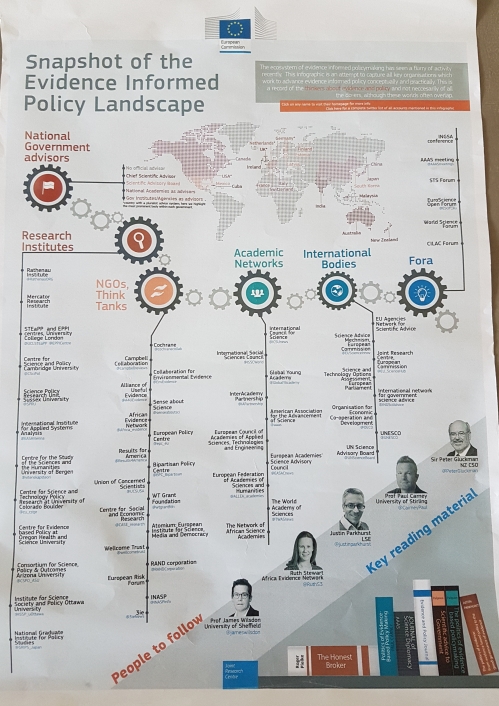Let’s be optimistic for a few seconds, and focus on the idea that a vote for the UK to leave the European Union was a vote for UK sovereignty and ‘taking back control’ of policy and policymaking. The comparison is between an EU process that is distant and undemocratic and a UK process we can all understand and influence, following the simple phrase ‘if you know who is in charge, you know who to blame’.
The down side is that we don’t know who is in charge, and it’s often futile to try to find a named individual or role to blame. The EU certainly complicates the picture, but don’t be fooled into thinking that we will eventually produce a UK political system that anyone understands.
If giving a lecture, this is the point at which I’d pause for effect and restate the idea that no-one understands the UK policymaking system as a whole [insert meaningful looks here]. Many people know about many parts of the system, but it’s not like a jigsaw puzzle that we’ve completed by working together. At best, it’s like that Dalmatian jigsaw that we started at Christmas before getting drunk and falling out.

Instead, policymakers and commentators tell simple stories about British politics
The dominant story of British politics relates initially to the idea of parliamentary sovereignty: we vote in constituencies to elect MPs as our representatives, and MPs as a whole represent the final arbiters on policy in the UK. This idea connects strongly to elements of the ‘Westminster model’ (WM), a shorthand phrase to describe key ways in which the UK political system is perhaps designed to work. Perhaps policymaking should reflect strongly the wishes of the public. In representative democracies, political parties engage each other in a battle of ideas, to attract the attention and support of the voting public; the public votes every 4-5 years; the winner forms a government; the government turns its manifesto into policy; and, policy choices are carried out by civil servants and other bodies. In other words, there should be a clear link between public preferences, the strategies and ideas of parties and the final result.
The WM serves this purpose in a particular way: the UK has a plurality (‘first past the post’) voting system which tends to exaggerate support for, and give a majority in Parliament to, the winning party. It has an adversarial (and majoritarian?) style of politics and a ‘winner takes all’ mentality which tends to exclude opposition parties. The executive resides in the legislature and power tends to be concentrated within government – in ministers that head government departments and the Prime Minister who heads (and determines the members of) Cabinet. The government is responsible for the vast majority of public policy and it uses its governing majority, combined with a strong party ‘whip’, to make sure that its legislation is passed by Parliament.
In other words, the ‘take home message’ of this story is that the UK policy process is centralised and that the arrangement reflects a ‘British political tradition’: the government is accountable to public on the assumption that it is powerful and responsible. So, you know who is in charge and therefore who to praise or blame, and elections every 4-5 years are supplemented by parliamentary scrutiny built on holding ministers directly to account.
These stories are more useful for our entertainment than enlightenment
Consider these five factors which challenge the ability of elected policymakers to control the policy process.
- Bounded rationality. Ministers only have the ability to pay attention to a tiny proportion of the issues over which have formal responsibility. So, how can they control issues if they have to ignore almost all of them?
- Policy communities. Ministers delegate responsibility to civil servants at a quite-low level of government. Civil servants make policy in consultation with interest groups and other participants with the ability to trade resources (such as information) for access or influence. Such relationships can endure long after particular ministers or elected governments have come and gone.
- Multi-level governance. The UK government shares policymaking ‘vertically’ (with international, EU, devolved, and local governments) and ‘horizontally’ (with non-governmental and quasi-non-governmental organisations).
- Complex government. Policymaking ‘emerges’ from the interaction between many actors, institutions, and regulations. In complex policymaking systems, people act without full knowledge of how other people act elsewhere in the system.
- Policy environments. Many policy conditions and events are out of policymakers’ control (including demographic, technological, and economic change)
So, for example, the UK government has to juggle two stories of British politics – on the need to be pragmatic in the face of these five challenges to their power and sense of control, versus the need to construct a strong image of governing competence with reference to control – in the knowledge that one of them is a tall tale.
Brexit will change only one part of that story
None of these factors should prompt us to minimise the influence of the EU on the UK. Rather, they should prompt us to think harder about the impact of Brexit on ‘parliamentary sovereignty’ and ministerial accountability via UK central government control. The phrase ‘you know who is in charge, and who to blame’ will become a more important rallying cry in British politics (when we can no longer blame the EU for British policy), but let’s focus on what actually happens in British politics and recognise how little of it we understand before we decide who to blame.
This post is an amended version of the introductory post for the course POLU9UK: Policy and Policymaking in the UK which draws on this ‘1000 Words’ series on public policy.









